-
 Mail us
Mail usinfo@myhealthhospitals.com
-
 Toll Free
Toll Free+91 9111674111
- Book Appointment
Laparoscopic
When it comes to advanced and minimally invasive surgical procedures, Dr. Krishna Chaitanya Vattem is widely regarded as the best laparoscopic surgeon in Hyderabad. With years of experience and expertise in laparoscopic and gastrointestinal surgeries, Dr. Krishna Chaitanya has successfully treated numerous patients, making him a trusted name in the field.
Laparoscopy is an effective procedure to treat certain conditions such as hernia, gallbladder stones, appendicitis, etc. This procedure is also known as keyhole surgery due to the minute nature of incisions involved. The surgeon uses a long, thin instrument called a laparoscope which is attached to a high-resolution camera on the other end. The camera provides live images of the organs and tissues in the abdomen. The surgeon locates the epicenter of the disease via an external monitor and operates with high precision.
Laparoscopic surgeons refer to a category of specialists who have years of practice in performing laparoscopic surgeries. These surgeons are also called general surgeons who use minimally invasive techniques for performing the surgery. Laparoscopy requires precision to operate on sensitive areas of the abdomen without having full access to the organs, unlike open surgery.
Dr. Krishna Chaitanya is recognized as one of the best laparoscopic surgeon in Hyderabad, known for his expertise, advanced surgical techniques, and dedication to providing exceptional care to his patients.
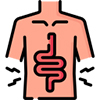
Abdominal pain can stem from various causes, including indigestion, infections, or underlying medical conditions....
READ MORE
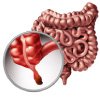
Appendicitis is an inflamed appendix, causing sharp right-sided abdominal pain, fever, and nausea, often requiring surgical removal for treatment....
READ MORE
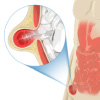
A breast lump could be benign or malignant, requiring medical evaluation to determine its nature and appropriate course of action....
READ MORE
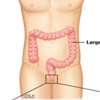
A fissure in ano is a painful tear in the anal lining, causing discomfort, bleeding, and often necessitating medical treatment....
READ MORE
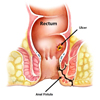
A fistula in ano is an abnormal tunnel between the anus and surrounding area, often causing pain, drainage, and requiring medical intervention.....
READ MORE
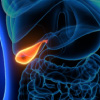
Gallstones are solid particles formed in the gallbladder, causing pain and potential blockages, sometimes requiring surgery or other treatments....
READ MORE

An inguinal hernia is a bulge of tissue through the abdominal wall in the groin area, often requiring surgical repair....
READ MORE
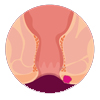
A perianal abscess is a painful collection of pus near the anus, usually necessitating medical drainage and sometimes surgical intervention....
READ MORE

Piles (hemorrhoids) are swollen blood vessels in the rectum or anus, causing discomfort, bleeding, and may require lifestyle changes or medical treatment....
READ MORE
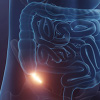
Scrotal swelling due to a hydrocele involves fluid accumulation around the testicle, often requiring medical attention or surgical correction....
READ MORE
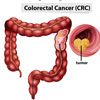
Colorectal refers to the colon and rectum, with conditions like cancer or inflammatory diseases affecting this part of the digestive system.....
READ MORE

Thyroid swelling, often due to goiter or thyroid nodules, can lead to neck enlargement and may require medical evaluation and treatment....
READ MORE
Dr. Krishna Chaitanya Vattem specializes in performing complex laparoscopic surgeries with precision. His expertise includes:
Dr. Krishna Chaitanya Vattem has successfully performed over 500 gastrointestinal surgeries, demonstrating his high success rate and patient satisfaction. His qualifications and commitment to patient care make him a preferred choice for laparoscopic procedures.
Practicing at My Health Hospital, Kukatpally, Hyderabad, Dr. Krishna Chaitanya ensures that his patients receive top-quality care. The hospital is equipped with advanced laparoscopic technology, ensuring minimal pain, faster recovery, and reduced hospital stay for patients undergoing surgery.
Laparoscopic surgery is a minimally invasive procedure that offers several advantages over traditional open surgery, including:
If you are looking for the best laparoscopic surgeon in Hyderabad, Dr. Krishna Chaitanya Vattem is the trusted expert you need. Book a consultation today at My Health Hospital, Kukatpally for advanced and effective laparoscopic treatments.
Laparoscopic surgery is a minimally invasive surgical procedure that uses small incisions and a camera to perform surgeries with reduced pain and faster recovery.
Laparoscopic surgery is commonly used for gallbladder removal, hernia repair, appendectomy, bariatric surgery, and gastrointestinal procedures.
Yes, laparoscopic surgery is a safe and effective procedure when performed by an experienced surgeon like Dr. Krishna Chaitanya Vattem.
In laparoscopic surgeries, the surgeon makes minimal incisions similar to the size of a keyhole. The laparoscope assists the surgeon by providing live images on an external monitor. It is an advanced procedure that ensures faster recovery. Open surgery involves a large incision which increases the amount of blood loss and increases the recovery time.
Laparoscopic surgery usually takes around 30 minutes to 1 hour, depending on the medical condition of the patient and the surgical expertise of the surgeon. The OT time for laparoscopic surgery also varies according to the type of disease.
No, laparoscopic surgery is not painful since the patient is administered general or local anesthesia. The patient is either sedated or asleep throughout the surgery and does not feel any pain. However, slight numbness around the incision site may be felt after the effects of anesthesia wear off.
Patients can resume their normal routine within a week after the laparoscopic procedure with certain restrictions around exerting and lifting heavyweights. However, full recovery may take around two weeks, depending on the type of disease.
Laparoscopic surgeons at My Health have a minimum experience of 8 to 10 years. My Health has experienced surgeons with an excellent track record of successful laparoscopic surgeries that ensure a success rate of over 90%.
Laparoscopic surgery involves small incisions, unlike open surgery. Due to small incisions, there is less blood loss which leads to a faster recovery. Patients can resume their daily work within 7 to 10 days after consulting the doctor.
Medical tools and instruments used during laparoscopic surgery depend on the type of disease to be treated. However, most of the time, the surgeon uses these standard tools and equipment during laparoscopy –
Visit any of our My Health Hospitals branches for advanced medical care and expert consultations.
H.No 15-24-212, MIG-212, Rd Number 1, K P H B Phase 1, Kukatpally, Hyderabad, Telangana 500072
H.No:-12-5-30, WhiteHouse, Moula Ali Rd, South Lalaguda, Tarnaka, Secunderabad, Telangana 500017